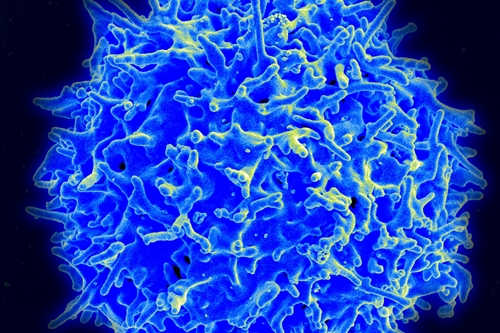
Scanning electron micrograph of a human T-cell lymphocyte (National Institute of Allergy and Infectious Diseases, NIH)
7 March 2018. The MD Anderson Cancer Center in Houston is starting Optera Therapeutics Corp., a new company to commercialize its research on treating cancer with a patients’ own immune system cells. The digital-biological systems company Berkeley Lights Inc. in Emeryville, California is partnering with MD Anderson to design Optera’s cell manufacturing capabilities.
Optera plans to develop engineered cell treatments that take a patient’s own T-cells from the immune system, alter their genetics to express cancer-fighting proteins, then return the cells to the patient to fight their tumors or blood-related cancers. Chimeric antigen receptors or CAR T-cells, engineered T-cell receptors, tumor-infiltrating lymphocytes, and endogenous T-cells are some of these cancer therapies.
The company is expected to license advances of several MD Anderson researchers studying cellular immunology, working in solid tumor and blood-related cancers, as well as stem cell transplants: Cassian Yee, Katy Rezvani, Elizabeth Shpall, Chantale Bernatchez, Sattva Neelapu, and Greg Lizee. Science and Enterprise reported on efforts by Shpall and Neelapu in September 2017, leading a group writing safety guidelines for CAR T-cell therapies, where patients experience high rates of adverse effects.
Berkeley Lights is a 7 year-old spin-off enterprise from University of California in Berkeley, developing systems that automate many cell biology workflows. The company says its technologies make it possible to select cells with precise properties, then clone and process thousands of cells with those characteristics simultaneously. Its platform, known as Beacon, uses microfluidic or lab-on-a-chip components that that enable combining cell selection with cell importing, testing, and exporting in a single device.
One of the company’s main applications is cellular therapies, particularly for treatments using a patient’s own cells, like those proposed by Optera Therapeutics. Its Searchlight system, says Berkeley Lights, is designed for development and manufacturing of cell therapies in an integrated process that can be deployed as a centralized manufacturing system or at bedside. In addition, says the company, the Searchlight system is compliant with Good Manufacturing Practices, or GMP, pharmaceutical production standards that allows for cell manufacturing without building a separate GMP-compliant facility.
Patrick Hwu, specialist in melanoma and a cancer medicine division chief at MD Anderson, says in a joint statement that Optera is a continuation of the medical center’s mission. “Our hope is,” says Hwu, “that by combining our cell therapy research expertise with advanced automation capabilities, we will enhance our ability to deliver these treatments to every patient who needs them.”
More from Science and Enterprise:
- Patents Awarded for Genetic Editing of CAR T-Cells
- Engineered T-Cells Show Extended Leukemia Remission
- T-Cell Therapy Company Gains $100M in Venture Funds
- CAR T-Cells Shown Effective in Long-Term Studies
- Genome Editing Enhances CAR T-Cells to Fight Cancer
* * *

 RSS - Posts
RSS - Posts
[…] Company Formed to Develop Cancer Cell Therapies […]